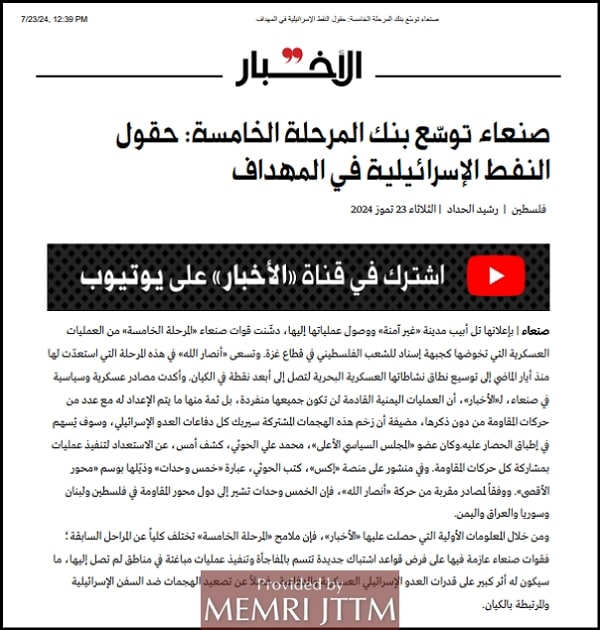The following report is now a complimentary offering from MEMRI's Jihad and Terrorism Threat Monitor (JTTM). For JTTM subscription information, click here.
On July 23, 2024, the pro-Hizbullah Lebanese Al-Akhbar daily published an article that describes what the anticipated "fifth phase of escalation" declared by Yemen's Iran-backed Ansar Allah movement (the Houthis) will comprise, following an attack by the Israeli Air Force on Al-Hudaydah Port in Yemen. According to the article, which is based on various political and military sources, some of the operations that the Houthis plan to carry out during this phase will be in cooperation with other resistance movements, including Palestinian, Lebanese, Syrian, and Iraqi movements. Their aim is to disrupt Israel's defense systems and to change "the rules of the game." In this context the daily reports that the Houthis intend, among other things, to block the maritime supply roots to Israel, by way of the Cape of Good Hope, and to expand their bank of targets to include the Israeli ports of Ashod and Ashkelon, the gas rigs in the Mediterranean Sea and the Dead Sea, power plants, and more.

The following is a review of the article in Al-Akhbar:
The Al-Akhbar article quotes "political and military sources in Sanaa" as stating that some of the anticipated operations by the Houthi armed forces will be carried out jointly with other resistance movements, so as "to confound the defense systems of the Israeli enemy and contribute to the siege that has been imposed on it." The paper mentions a July 21, 2024 post on X written by Houthi Supreme Political Council member Muhammad Ali Al-Houthi, in which he typed the number "one" five times and concluded with the hashtag #AxisAl-Aqsa. The daily notes that in that post Al-Houthi revealed the preparations currently taking place to perpetrate joint operations by all the resistance movements in the region. It further quotes "sources close to the Ansar Allah movement" which explained that the five numbers in Al-Houthi's post represent the countries that are part of the axis of resistance – Palestine, Lebanon, Syria, Iraq, and Yemen.
According to "preliminary information" at its disposal, claims Al-Akhbar, "the fifth phase" that the Houthis announced will be completely different from the previous phases. In this latest phase, writes the paper, the Houthis intend to change "the rules of the game" by carrying out "surprise operations" on areas that they haven't targeted before. This will reportedly be in addition to an increase in the attacks against Israeli ships and also vessels with connections to Israel, as well as "surprises" in the sphere of military production, and introducing new weapons systems into the battlefield.
The article also quotes "military and knowledgeable sources" which say that the new phase is intended to achieve "strategic objectives," and that it will be the preface to the battle of "the hereafter promise," namely what the Houthis and other jihadist movements sees as a Quranic promise regarding the liberation of Palestine and the demise of Israel, which in turn is to be followed by a sixth phase. These sources say that the weapons to be used during this phase are "sophisticated, high-quality, and long-range" as well as impossible to detect or intercept by the enemy's defense systems. They claim that among these weapons systems are "speedy and accurate missiles," that have already been launched at "sensitive targets" deep in enemy territory and were not intercepted by the Israeli Arrow air defense system.
Al-Akhbar writes that according to its sources, the Houthi forces are expected to block the naval supply routes to Israel, via the Cape of Good Hope, as well as to expand the scope of their activity in the Mediterranean Sea and the Indian Ocean; to include additional seaports in their bank of targets, among them the Israeli ports of Ashdod and Ashkelon; and to increase their attacks on Haifa Port. The sources also purportedly claim that the Israeli Air Force attack on Hudaydah Port in Yemen and on nearby oil storage facilities pushed the Houthis to include the following new Israeli targets in their bank of targets: the Leviathan natural gas fields in the Mediterranean Sea, the Tamar natural gas field and the "Shemen field" [sic] in the Mediterranean Sea, and the Zohr natural gas field in the Dead Sea. Also listed as new targets are several power plants, such as the Orot Rabin power station located on the Mediterranean coast in Hadera, the Rutenberg coal-powered power plant, the Eshkol power plant, the Haifa refinery power plant, and dozens of oil storage facilities across Israel, as well as the oil supply that is shipped to Israel from Azerbaijan and Kazachstan, via the Mediterranean Sea.
The full text of this post is available to subscribers.
Please login or register to request subscription information from MEMRI






